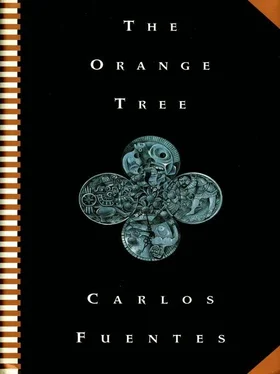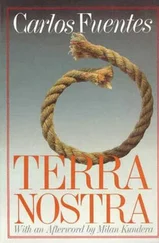“How many Mexicans do we have here? One, two … counting you, there are five of us.”
He says he hopes there will be seven Mexicans in Maggie’s Bar, his seven dwarfs he says. He serves me an insipid margarita, then a sour bellini, and confesses (I’m drinking but he’s getting drunk) that the erotic dream of his childhood was Walt Disney’s Snow White and the Seven Dwarfs. Actually, he winks at me, it was more than erotic, it was a sadoerotic fantasy. He says he imagined himself as Snow White — he laughs insinuatingly — waiting for the little dwarfs to abuse her. All those leather belts, those boots, those nails and hammers, how I wanted to ask all those little people, Crucify me, little guys, or let’s play Saint Sebastian, wham!
I smiled and said that the good thing about Snow White is that we can talk about the movie without revealing our ages because they bring it out again every two or three years. He didn’t understand what I said, but he did get annoyed because I said it in English and fouled up his national arithmetic.
I went out for a stroll along the Costera, invaded now by bars, Polynesian restaurants, hamburger joints, Kentucky Frieds, and Tastee-Freeze. In the third world, people must think Colonel Sanders is a hero of the Civil War: his round face, white and bearded, his benevolent spectacles — you see his face more often around here than the Divine Face of Jesus Christ. More Colonel than Savior! I say to myself, a little drunk now because of the bad combo the sadomasochauvinist bartender at Maggie’s served me. I stop off for a minute at Carlos ‘n’ Charlie’s. It’s decorated with old movie posters, and on one of them I find my name, very tiny, very far down in the order of credits. This for sure is no fairy tale. This ages you for sure, bartender. I’m fifty-five and really in need of a fairy tale. Instead, I get a glass of warm tequila and think about a frozen Oscar.
1:22
The kid sitting next to me in the jeep told me how to get to the garden illuminated by Chinese lanterns and shook hands with me when we got out. Only then did I realize that my small guide looked like me: he had bushy brows, was smooth-faced, and had sharply delineated features despite the fact that he was ten or twelve years old. It’s hard to tell how old people are in the tropics: there are twelve-year-old mothers and grandmothers of thirty, old people without a single gray hair and children with no teeth left. In the case of my little companion, what was left of his baby fat had been sliced off long ago by a calendar whose pages were steel knives. In the eyes of that Acapulco baby, time went by with no respect for childhood, old age, or any other age.
In those black eyes, I saw a time that had no consideration for individuality. That’s a fear I have at times, when I escape from my own more or less protected singularity, which I’ve constructed, I think, carefully and patiently, when I face a bereft humanity whose circumstances neither differentiate nor respect anyone. That’s why I got so much out of being directed by Leonello Padovani. In my role, I found the proper balance, the exact quality that put me between this Mexican bereavement I fear so much and the American overprotection I despise so much. It was possible to be oneself with others, a myself with the themselves. I learned that then and don’t want to lose it. Cindy doesn’t understand. She associates success with protection; Latin Americans associate it with unhappiness. In Europe, it was possible to be something else, something like a collective subject in a shared intimacy.
The boy led me to the whorehouse where I’d asked him to bring me. This boy: How many tons of deodorant, refrigerators stuffed with frozen food, cereals with fiber, Jacuzzis, Porsches, and VHS systems would he need to protect himself from the hopeless fate devoid of individual handholds already in his eyes? If I could take him away, living in real life my screen character, take him by the hand to the roads of pure chance, freedom, encounters … The way things are, he’s going to need much more than the ten dollars I gave him at the entrance to the bordello named the Fairy Tale.
Immediately after
Palapa palms are the Gothic cathedrals of the tropics. Anything can take place beneath the protective umbrella of their dry, dusty leaves: protection from the sun, sanctuary from the night, subverted space. The palapa of the Fairy Tale is a perfect if overflowing circle of humanity (men only) around a dance floor where girls between fifteen and twenty years old are dancing naked, breasts exposed, with sometimes only a bikini bottom covering their sex. Sometimes even less than that: what they call a string bikini in Rio de Janeiro — dental floss. Sometimes nothing. And sometimes, at most, a coquettish silk shawl draped around their hips when they serve drinks to the throng of young men.
Few tourists. Almost all the customers look as though they come from Acapulco. I’ve been seeing them since I got to the airport. They’re almost like old friends. I saw them driving buses and taxis, loading luggage, loitering at the doors to pharmacies or the balconies of clinics devoted to venereal diseases. I saw them in bank offices and hotels. I will have to make Western man’s effort at differentiation when faced by third-world masses. Chinese, Africans, Mexicans, Iranians: they’re all the same for the gringos, hard to tell one from another. And I tell myself we must be the same for them. But not me. I’m a black Irishman, remember? The Apollo of B films. At the age of fifty-five, I can trick myself out to look forty-five. A real rejuvenator. That’s what everyone tells me, and I’ve ended up believing it. Besides, in movies my youth is preserved forever. I shouldn’t belie it, even if it brings me to an early grave.
I laugh, fix up my hair a bit, roll up my sleeves a bit, have a burning desire for a little mustache, even if it were as ridiculous as the one the hotel receptionist has; I try to imitate a look of oily lust so I can mix in, lose myself in the macho clientele shouting clothes, clothes, and ass, ass, and who stretch out their hands to touch the girls dancing to a salsa; but one voice dominates everything, the shouts, the music, the dancing of the naked girls on the dance floor: You can look, you can listen, you can even sniff, but around here you can’t touch anything.
I make out a woman sitting under a Count Dracula light opposite the sound equipment, protected by a shield of plastic and Plexiglas. She wears a pearl necklace and a velvet bustier with a white, raised collar, like a cloud or a parachute, behind her neck. She’s just like Snow White. She protects herself in front with the plastic shield and covers her back with the stiff, high collar. The fact is she dominates the scene the way she dominates her head, which is covered with hairpins and looks like a porcupine. She must be afraid that not every hair’s in place.
“Welcome to a night hotter than last night,” she declaims. “You can look, you can listen, you can even sniff, but around here you can’t touch anything.”
A drunken guffaw, and a potbellied man rushes out onto the dance floor expressly to touch a dancer. Everyone shouts in protest: the rules of the establishment — a gentlemen’s agreement — are being broken. All Snow White has to do is speak calmly into the microphone, “Security, security,” and a phalanx of bare-chested masked men in wrestling tights disposes of the drunk in two or three quick movements. He’s rushed out amid the laughter and wisecracks of the young men present.
Snow White invites a man to step out onto the floor and sit down on a little straw chair. The spotlight falls on me. Snow White shouts, Lights, lights on the guy in pink; The guy in pink they all shout, pushing me onto the floor, the too low chair where I sit down and receive instructions: You just look, listen, and sniff, but please don’t touch.
Читать дальше












